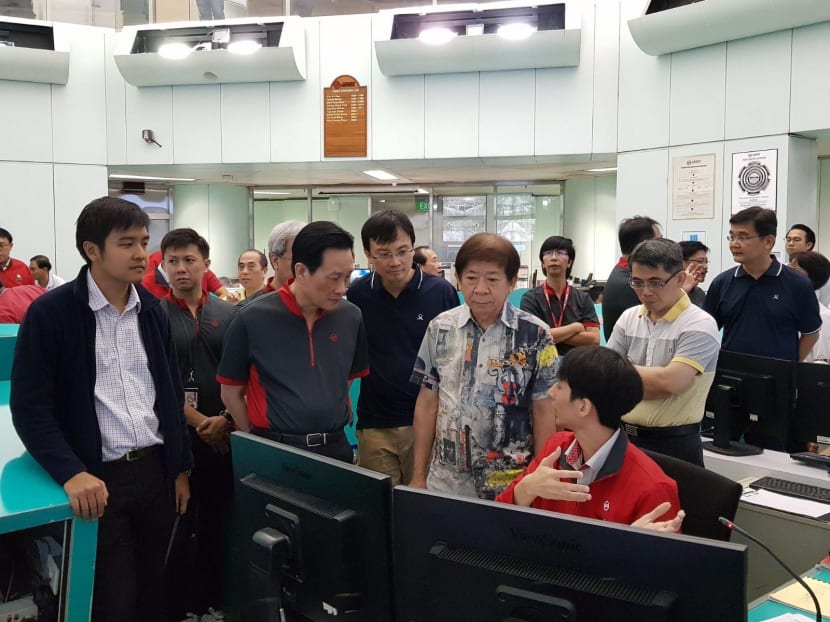Khaw flags 'glitches and delays' on NSEWL as signalling tests extend to operating hours
SINGAPORE — Commuters on the North-South and East-West lines (NSEWL) may experience delays and glitches, as the authorities extend testing of the new signalling system to rail operating hours.

Transport Minister Khaw Boon Wan visited SMRT’s Operations Control Centre on Saturday (March 10) night to observe tests on the NSEWL of the new signalling system, supplied by French multinational firm Thales and which allows trains to arrive at closer intervals during peak hours. Photo: SMRT via Facebook
SINGAPORE — Commuters on the North-South and East-West lines (NSEWL) may experience delays and glitches, as the authorities extend testing of the new signalling system to rail operating hours.
Posting on Facebook on Sunday (March 11), Transport Minister Khaw Boon Wan said: "We plan to extend testing to revenue hours, i.e. with passengers on board. Expect glitches and delays. I urge commuters to bear with us and thank them for their patience."
Mr Khaw did not provide details on when the tests would start, the periods of the day that the tests would be conducted or how long they would go on for.
Last year, rail operator SMRT and the Land Transport Authority (LTA) began testing the new signalling system on the NSL during the last hour of passenger service from March 28, after more than six months of tests during non-revenue hours.
From April 16 last year, the re-signalling tests were extended to a full day on Sundays, before full-day weekday trials started on May 29, 2017.
The full-day trials allowed engineers from SMRT, LTA and Thales – the supplier of the signalling system – to conduct stress tests and observe the system’s performance “under intense operational conditions that are typical of weekday peak hours, when trains are running at high frequencies with heavy commuter loads”, SMRT and LTA said in an earlier statement.
But the trials led to multiple delays for NSL commuters before the new system stabilised. Last June alone, there were 27 delays, Mr Khaw told Parliament last September.
This time round, the schedule for tests on the EWL during revenue hours could be different, TODAY understands.
Re-signalling tests on the EWL have already "intensified" during engineering hours without passengers on board the trains, wrote Mr Khaw, who also posted photos of his visit the previous night to SMRT's Operations Control Centre. He was there to observe tests on the NSEWL of the new signalling system, which allows trains to arrive at shorter intervals during peak hours.
"Testing allows us to calibrate and tune the signalling equipment on each train. That is why re-signalling is so complicated and time-consuming," said Mr Khaw.
"Learning from the NSL experience, we are intensifying testing of the system, without passengers. This means doing so during engineering hours. That is why the #ECLO (Early Closure, Late Opening) is so useful to us," he said.
"Extra engineering hours (provide) us with longer blocks of time on the train tracks. With ECLO for the entire EWL, we are also able now to test the new system for the entire line, and not just partial stretches."
Shorter hours of operation did not come into play when the new signalling system was implemented for the NSL last year.
The authorities took the drastic step of curtailing rail operating hours from December last year, after a collision between two trains at Joo Koon MRT station last November caused by software glitches and compatibility issues between the old and new signalling systems.
Mr Khaw's announcement follows a statement by SMRT and LTA last week that late openings and early closures would extend beyond June this year for the renewal of the NSEWL's critical rail systems. These include the signalling system, power supply system and track circuit system, which is used to detect the location of trains on the line and facilitate speedier recovery from a signalling system failure.
Parallel shuttle buses will be provided at the affected MRT stations.






